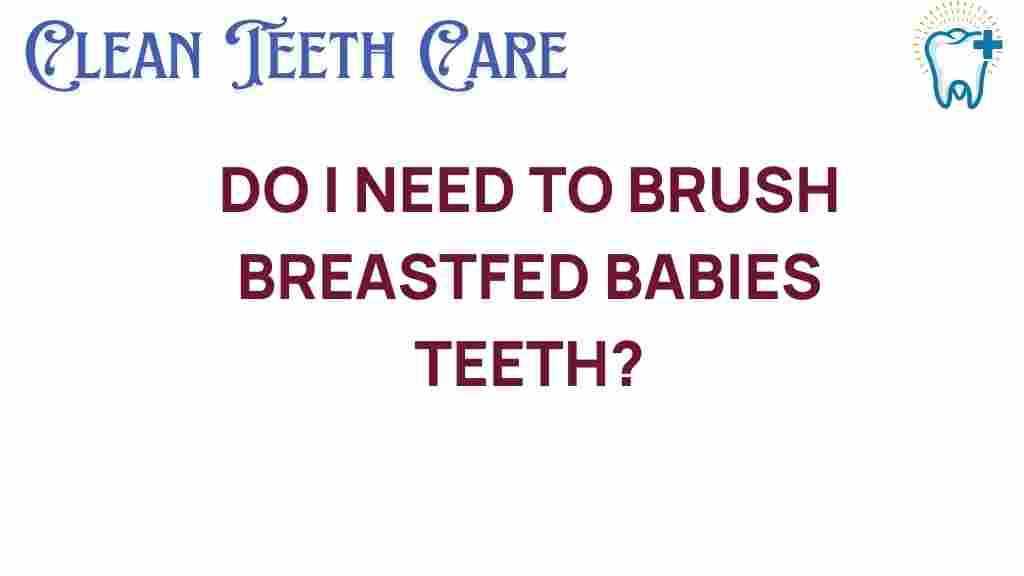Do You Really Need to Brush Your Breastfed Baby’s Teeth?
As a parent, your primary concern is the health and well-being of your child. When it comes to breastfed babies, ensuring proper oral hygiene is crucial, even before their first teeth emerge. Many parents wonder whether they should start brushing their baby teeth and at what age to begin. In this article, we will explore the importance of dental care for breastfed babies, along with practical parenting tips for maintaining their early oral health.
The Importance of Dental Care for Breastfed Babies
Breastfeeding has numerous benefits for infants, including nutritional advantages and bonding opportunities. However, it is essential to understand that breastfed babies are still susceptible to dental issues that can arise even before their teeth come in. Here are a few reasons why dental care is vital:
- Prevent Cavities: Breast milk contains lactose, which can contribute to tooth decay if not properly managed.
- Healthy Habits: Establishing a dental care routine early sets the foundation for good oral hygiene habits as your child grows.
- Pediatric Dentistry Recommendations: Dentists recommend that parents start cleaning their baby’s mouth even before teeth appear.
When to Start Brushing
Understanding when to start brushing can be confusing for many parents. Here’s a step-by-step guide:
- Before Teeth Erupt: Clean your baby’s gums with a soft, damp washcloth or a finger brush after feedings.
- When First Teeth Erupt: As soon as the first tooth appears, you should start brushing it with a soft-bristled toothbrush and a tiny smear of fluoride toothpaste.
- Regular Brushings: Aim for brushing twice a day – once in the morning and once before bedtime.
How to Brush Your Baby’s Teeth
Brushing your baby’s teeth is crucial for their health and early oral health. Here’s how to do it:
- Select the Right Tools: Use a soft-bristled toothbrush designed for infants and a pea-sized amount of fluoride toothpaste.
- Positioning: Sit your baby on your lap or lay them down in a comfortable position where you can easily access their mouth.
- Brush Gently: Gently brush each tooth using a circular motion. Make sure to reach the back teeth and along the gum line.
- Encourage Spitting: As they grow older, encourage your child to spit out toothpaste rather than swallow it.
Common Concerns and Troubleshooting Tips
As a parent, you may encounter several challenges regarding your infant’s dental care. Here are some common concerns and troubleshooting tips:
Teething Troubles
Teething can make your baby fussy and reluctant to allow their mouth to be touched. Here’s how to handle it:
- Use a chilled teething ring to soothe their gums.
- Try massaging their gums gently with a clean finger.
- Be patient and gentle during brushing, even if they resist.
Reluctance to Brush
If your baby doesn’t want to cooperate during brushing, try these tips:
- Make it a fun activity by singing songs or playing games.
- Let your child hold the toothbrush and mimic your actions.
- Set a routine so they know what to expect.
The Role of Pediatric Dentistry
Regular visits to a pediatric dentist are essential for monitoring your child’s oral hygiene and identifying any potential issues early. Here’s what to expect:
- First Visit: Schedule your child’s first dental visit by their first birthday or within six months of their first tooth erupting.
- Preventive Care: Pediatric dentists can offer preventive care and advice tailored to your baby’s needs.
- Education: They will educate you on proper oral hygiene practices and diet choices that support healthy teeth.
Nutrition and Oral Health
What your baby eats plays a significant role in their dental health. Here are some nutritional tips for maintaining oral hygiene:
- Avoid Sugary Foods: Limit sugary snacks and drinks, which can lead to cavities.
- Healthy Choices: Offer fruits, vegetables, and whole grains that promote healthy teeth.
- Hydration: Ensure your baby stays hydrated, particularly if they are transitioning to solid foods.
Conclusion
If you are a parent of a breastfed baby, understanding the importance of dental care is crucial for your child’s health. By starting a routine early, you can help prevent dental issues and instill good habits that will last a lifetime. Remember, effective infant care involves not just feeding but also taking care of your baby’s oral health. Regular visits to a pediatric dentist will ensure that your child’s teeth and gums are healthy as they grow. For more information on pediatric dentistry, visit this resource or consult your local dental professional.
By following these parenting tips, you can ensure that your baby’s transition from breastfeeding to solid foods is smooth and healthy. Nurturing their early oral health will set them up for a lifetime of beautiful smiles!
This article is in the category Hygiene and created by CleanTeethCare Team
